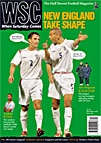 There's only one manager Fergie hasn't seen the back of, even if he got the better of him in the League Cup in October. Charles Morris looks at the remarkable Dario Gradi of Crewe
There's only one manager Fergie hasn't seen the back of, even if he got the better of him in the League Cup in October. Charles Morris looks at the remarkable Dario Gradi of Crewe
This autumn has witnessed a celebration of that rare phenomenon in English football – longevity among managers. The press went misty-eyed over Arsène Wenger’s ten years at Arsenal and the Carling Cup tie between Crewe Alexandra and Manchester United provided an opportunity to wax lyrical about their respective 65-year-old managers, Dario Gradi and Sir Alex Ferguson. The game preceded Ferguson’s 20th anniversary at Old Trafford, while Gradi, with 23 years at Gresty Road, is the Scot’s only counterpart in the English professional game to have been in situ at one club for longer.
No, Gradi cannot match the silverware accrued by Ferguson and Wenger, but he can outscore them in some respects. Wenger told Arsenal’s AGM in October that the club’s record in producing England-qualified players had been poor. “We have less developed English players than young foreign talent,” he was quoted as saying. “[England] has produced less talent because it responded later to the quality of the academy system.”
That may be the case in north London, but not in south Cheshire. Dean Ashton, Seth Johnson, Danny Murphy and Rob Jones are all products of Crewe’s academy who have reached the England squad, and the national team had previously included David Platt and Geoff Thomas after their careers were developed at Gresty Road. Likewise, Gradi’s tutelage helped Neil Lennon play for Northern Ireland and Robbie Savage for Wales.
The nurturing of internationals is just the icing on the cake of Gradi’s real achievement: the total transformation of Crewe, with the help of supportive directors. The workaholic manager is not without critics among the fans, although in this regard he is partly a victim of the success he has brought to the club since the then chairman, the late Norman Rowlinson, appointed him in June 1983.
At that time, the Alex were what they had been throughout most of their history – a joke team. The club’s primary post-war expertise was in continually securing re-election to the old Fourth Division. “There were 1,500 [spectators] in the ground, which was falling to bits, and Norman Rowlinson was [personally] paying the players’ wages,” is how David Coleman, secretary of the supporters’ association, sums up circumstances 23 years ago.
Gradi’s vision for the club was to develop their own young players, sell the best of them to earn necessary finances and then produce some more, in a continuous virtuous circle. And he had the talent-spotting and coaching genius that this strategy required.
His stewardship has seen the academy established, the construction of a training centre that he designed and the complete rebuilding of Gresty Road as a modern, 10,500-capacity stadium. He has won four promotions, two of which were to what is now the Championship, where Crewe have spent eight of the past nine seasons despite having average gates of only about 5,000. On the debit side are three relegations, none of which appear to have remotely tempted current chairman John Bowler to drop the pilot.
Furthermore, Gradi has insisted that his teams play attractive, passing football, and in a fair manner. The club has won the Bobby Moore Fair Play award eight out of the past ten seasons, and at least twice before that. (I remember one mid-1990s match during which Gradi was at one point yelling at Savage: “Stop fouling, Robbie, stop fouling!” Hindsight tells us that the manager was for once wasting his breath.) Gradi was awarded the MBE in 1998, but probably the accolade that best crystallised his achievements came this year when Crewe were voted the Football League’s most admired club, by the officials of other clubs.
Until the new millennium, criticism of Gradi by fans was rare. But since then sniping has increased as the team have twice been relegated from the Championship.John Ford, a fan for 50 years, says most of it has come from new and younger supporters attracted by the club’s success. They are “people who have enjoyed the Championship, going to Leeds and Southampton, but they have never been to the likes of Hartlepool and Halifax before”, he says. Older fans, however, recall the bad old days and remain grateful.
While Ford and Coleman regard Gradi as the club’s saviour, they nevertheless believe he has weaknesses. Both highlight a misplaced loyalty to players who have come through the academy but continually fail to shine in the first team.
Ford points to a man-management failing: “Some say he cannot communicate with the experienced players he has brought in.” He may also not be the best buyer of talent, with past big-money signings such as Rodney Jack, Dave Walton and Darren Foreman having provided mixed returns.
Yet Coleman perhaps offers a telling overall perspective on the Gradi years: “Dario’s first game in charge was against Rochdale. But Rochdale, like so many other small clubs, have stood still for 20 years, whereas we have moved upwards and onwards. We perceive our level to be two leagues above what it was when Dario arrived.”
From WSC 238 December 2006. What was happening this month